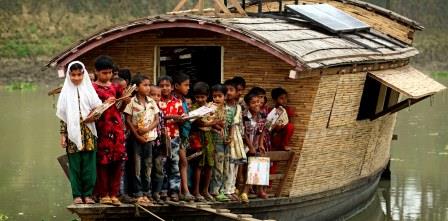Description
Extreme heavy rain is a frequent problem during the monsoon season and hundreds of schools have to shut down periodically. To address this, the non-profit organization Shidhulai Swanirvar Sangstha has developed 54 solar-powered boat schools that provide uninterrupted education all year round for children in the flood-prone areas of Bangladesh.
Onboard solar PV modules generate electricity for lights, Internet-linked computers, DVD/ CD players and video projectors. Many of the boats use solar PV to charge batteries for portable solar home lighting systems. The boat first serves as a school bus, making periodic stops to collect children from riverside collection points. The boat then docks and class begins. This is the way a floating school works throughout the day0.
Each school consists of a classroom for 30 students, a computer/laptop, hundreds of books, and electronic resources. School provides basic primary education up to Grade Four. As part of the curriculum, Shidhulai introduces a river-based environmental curriculum that teaches students how to protect the environment and conserve water. The floating boats provide supplementary services such as libraries, adult education centers, medical clinics and solar workshops. These floating boats bring electricity and technology access and the advances of education and modernity that accompany that increased energy access. They also try to make sure that as much of the energy they rely on is powered by solar sources.
Objectives and beneficiaries
This project yields both environmental and social benefits. Environmentally, the use of solar energy to power most of the electronics used on the floating schools. This is a sustainable and cost-effective way of meeting the school’s energy needs in the impoverished areas that they serve. Socially, the project enables students to have a holistic and uninterrupted education. Educating its children will be critical to Bangladesh’s development. The other education and medical services provided by these boats are also hugely beneficial to the communities they serve as it means that fundamental services that support life in these communities are not cut off during these difficult months. The project hopes that the education services provided will contribute to furthering the economic prosperity of these communities.
Strong points of the solution
Shidhulai Swanirvar Sangstha overcame the challenge that the ecosystem of Bangladesh poses and found an innovative way to deliver information and education to residents. Shidhulai has transformed the regions waterways into pathways for education, information and technology. Shidhulai has converted boats into schools, libraries, healthcare and trainings centers to the isolated waterside communities.
Expected results and benefits for climate change adaptation and mitigation
Shidhulai aims to transform the region’s waterways into pathways for education, information and technology. It aims to deal with climate change induced flooding, to protect the environment and people’s rights, and also to lift people out of poverty. Shidhulai’s 54-vessel fleet serves close to 97,000 people in flood-prone areas. Now people are benefiting from a better understanding on climate change, human rights, improved education, sustainable farming, increased income, solar lights and outside communications.
Results have been impressive: school boats currently serve around 1,600 students, with the library boats accessed by 15,000 people a year. Children's enrolment in education has increased by 40%, while the dropout ratio has been reduced by 45%. The health clinic boats have provided information on issues such as sanitation, HIV/AIDS, unintended pregnancies, reproductive rights and early marriage issues. Sanitary latrine usage has increased by 80%, while early marriage rates have fallen by 75%. Some of these changes are more directly linked to the use of these boat schools, but all indicate positive change.
Scalability potential of the solution
The technologies and practices are replicable in any area suffering from flooding disruptions. However, the teaching, funding and infrastructural mechanisms must all be in place as well.






